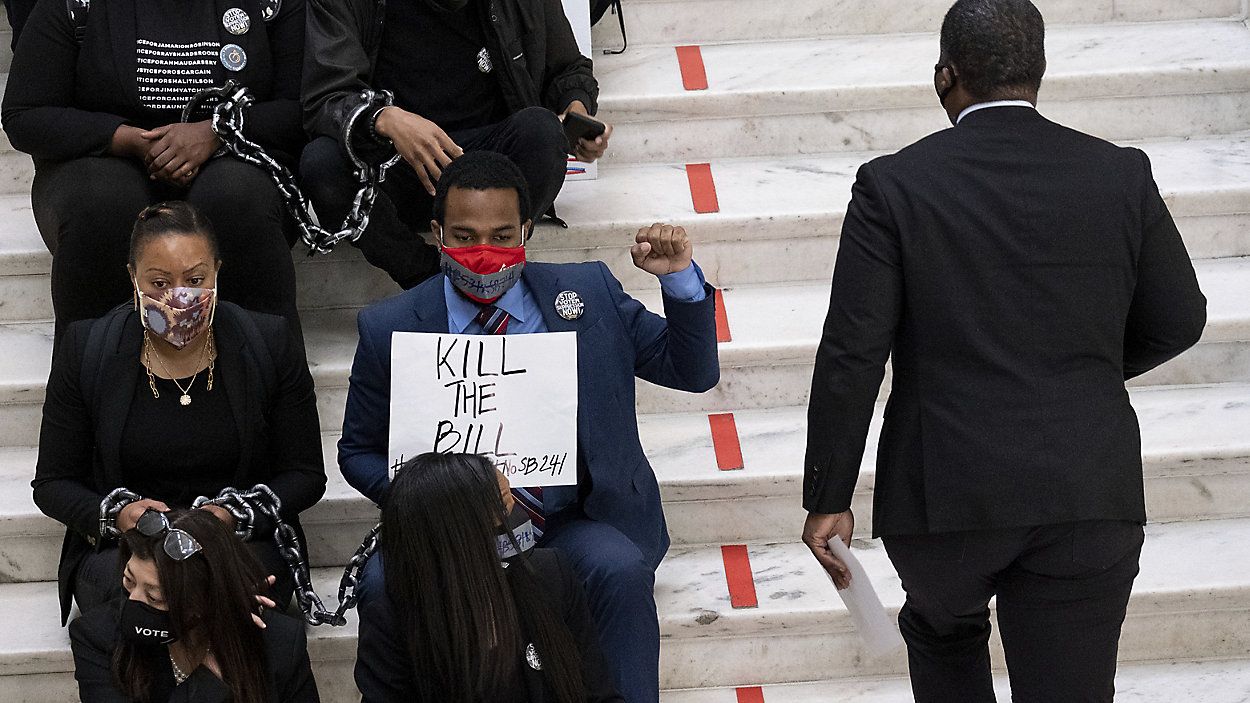Over 70 Black business leaders signed an open letter calling for corporate America to take action against restrictive voting laws, which was published as full-page advertisement in the New York Times Wednesday.
"As Black business leaders, we cannot sit silently in the face of this gathering threat to our nation's democratic values and allow the fundamental right of Americans, to cast their votes for whomever they choose, to be trampled upon yet again," the letter reads. "We call upon our colleagues in Corporate America to join us in taking a non-partisan stand for equality and democracy. Each of us stands ready to work with you on what can and must be done."
The effort, led by Kenneth Chenault, the former CEO of American Express and current board member of Berkshire Hathaway, and outgoing Merck CEO Kenneth Frazier, calls for corporations to "publicly oppose any discriminatory legislation and all measures designed to limit Americans' ability to vote."
"There is no middle ground here," Chenault told the New York Times. "You either are for more people voting, or you want to suppress the vote."
Other signatories on the letter include Ursula Burns, the former CEO of Xerox and current board member of Uber, René F. Jones, Chair and CEO of M&T Bank, Google executive Bonita C. Stewart, Roger Ferguson Jr., the CEO of TIAA, Raymond McGuire, the former Citi executive who is running for mayor of New York City, and Richard Parsons, the former Time Warner CEO and former member of President Barack Obama's economic advisory team.
Georgia Gov. Brian Kemp signed a Republican-backed voting bill into law last week which includes new restrictions on voting by mail and greater legislative control over how elections are run. Democrats and voting rights groups say the law will disproportionately disenfranchise voters of color. President Joe Biden called the bill "Jim Crow in the 21st Century" and "un-American."
The law adds a photo ID requirement for voting absentee by mail, cuts the amount of time people have to request an absentee ballot, and limits where drop boxes can be placed and when they can be accessed. It also bans people from handing out food or water to voters waiting in line and allows the Republican-controlled State Election Board to remove and replace county election officials.
The bill is part of a wave of GOP-backed election bills introduced in states around the country after former President Donald Trump stoked false claims that fraud led to his 2020 election defeat to Biden. According to the Brennan Center for Justice, there are 253 bills with provisions that restrict voting access in 43 states as of Feb. 19, 2021.
Frazier told the Times he "started paying attention" when Kemp signed the bill into law.
"We thought if we spoke up, it might lead to a situation where others felt the responsibility to speak up," Frazier told the Times, hoping to prevent other states from taking the same action Georgia did. "If corporate America doesn’t stand up, we’ll get these laws passed in many places in this country."
"Many people died for the right of Blacks being able to vote," Chenault said to CNN Wednesday. "What we're calling on corporations to do is not just say they believe strongly in the right to vote. It's to publicly and directly oppose any discriminatory legislation and all measures designed to limit any individuals ability to vote."
Delta Air Lines CEO Ed Bastian called Georgia's new voting law "unacceptable" and said that the "entire rationale for this bill was based on a lie" as calls for a boycott of the Atlanta-based airline grew.
Bastian made his position on the bill "crystal clear" in a letter to employees: "The final bill is unacceptable and does not match Delta’s values."
"The right to vote is sacred. It is fundamental to our democracy and those rights not only need to be protected, but easily facilitated in a safe and secure manner," Bastian added. "After having time to now fully understand all that is in the bill, coupled with discussions with leaders and employees in the Black community, it’s evident that the bill includes provisions that will make it harder for many underrepresented voters, particularly Black voters, to exercise their constitutional right to elect their representatives. That is wrong."
Another Black executive, Citigroup CFO Mark Mason, who was not one of the letter's signatories, called the bill a "disgrace" in a LinkedIn post.
"As an American, I am appalled by the recent voter suppression laws passed in the state of Georgia," Mason wrote. "I see it as a disgrace that our country’s efforts to keep Black Americans from engaging fully in our Constitutional right to vote continue to this day."
Referencing the letter, Mason pledged to "join the efforts of many of my fellow Americans in working to ensure other states don’t follow this horrible example."
Other Georgia-based companies, including Coca-Cola and Home Depot, are facing backlash and calls for boycott
The beverage giant's CEO James Quincey called the law "unacceptable" on CNBC Wednesday and said "it is a step backwards."
"This legislation is wrong, it needs to be remedied, and we will continue to advocate for it, both in private and in now even more clearly in public," Quincey added.
Coca-Cola previously said in a statement that the company has been engaged in "advocating for positive change in voting legislation."
Frazier called the Georgia bill "a prototype for a lot of bad laws" on CNBC.
"Fundamentally, if you can't oppose this legislation — that's the lifeblood for black Americans, the right to vote," Chenault added on CNBC. "We can't be silent, and corporate America can't be silent. And if they can't speak out on this issue, what can they speak out on?"



